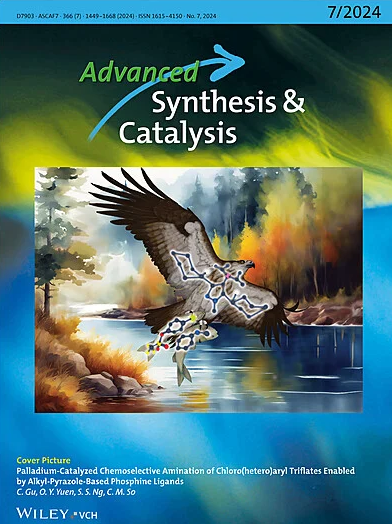二氧化碳还原甲基化研究进展与挑战
IF 4
2区 化学
Q2 CHEMISTRY, APPLIED
引用次数: 0
摘要
甲基化反应在有机化学中具有非凡的价值,从结构多样的有机功能化学品的组装到将甲基引入制药和农用化学品中间体。在可持续化学的背景下,二氧化碳(CO2)已经成为一种替代的绿色碳源。因此,近几十年来,利用二氧化碳作为甲基化剂的还原性甲基化策略获得了大量的研究兴趣,特别是在合成甲基化衍生物、在药物发现和农用化学品开发中具有广泛应用的化合物方面。本文从金属催化的C/N -甲基化反应、碱催化的C/N -甲基化反应、离子液体催化的C/N -甲基化反应以及基于各种还原剂的无催化剂C/N -甲基化反应等方面对CO2作为C1合成的还原性甲基化反应进行了综述和详细讨论。我们还阐明了这些还原性甲基化、竞争性副反应和代表性反应机制中的底物相容性。最后,对结论和未来发展趋势进行了展望。本文章由计算机程序翻译,如有差异,请以英文原文为准。
Advancements and Challenges in Reductive Methylation of Carbon Dioxide
Methylation reactions have extraordinary value in organic chemistry, ranging from the assembly of structurally diverse organic functional chemicals to the introduction of methyl groups into pharmaceutical and agrochemical intermediates. In the context of sustainable chemistry, carbon dioxide (CO2 ) has emerged as an idea and alternative greener C1 source. As a result, reductive methylation strategies utilizing CO2 as a methylating agent have garnered substantial research interest in recent decades, particularly for synthesizing methylated derivatives, compounds with broad applications in drug discovery and agrochemical development. In this review, reductive methylations using CO2 as C1 synthon have been summarized and discussed in detail with focus on metal‐catalyzed C/N‐methylation reactions, base catalyzed C/N‐methylation reactions, ionic liquids catalyzed C/N‐methylation reactions, and catalyst‐free C/N‐methylation reactions based on various reductants. We also elucidate substrate compatibility in these reductive methylations, competing side reactions, and representative reaction mechanisms. Furthermore, conclusions and future trends are depicted finally in this review.
求助全文
通过发布文献求助,成功后即可免费获取论文全文。
去求助
来源期刊

Advanced Synthesis & Catalysis
化学-应用化学
CiteScore
9.40
自引率
7.40%
发文量
447
审稿时长
1.8 months
期刊介绍:
Advanced Synthesis & Catalysis (ASC) is the leading primary journal in organic, organometallic, and applied chemistry.
The high impact of ASC can be attributed to the unique focus of the journal, which publishes exciting new results from academic and industrial labs on efficient, practical, and environmentally friendly organic synthesis. While homogeneous, heterogeneous, organic, and enzyme catalysis are key technologies to achieve green synthesis, significant contributions to the same goal by synthesis design, reaction techniques, flow chemistry, and continuous processing, multiphase catalysis, green solvents, catalyst immobilization, and recycling, separation science, and process development are also featured in ASC. The Aims and Scope can be found in the Notice to Authors or on the first page of the table of contents in every issue.
 求助内容:
求助内容: 应助结果提醒方式:
应助结果提醒方式:


